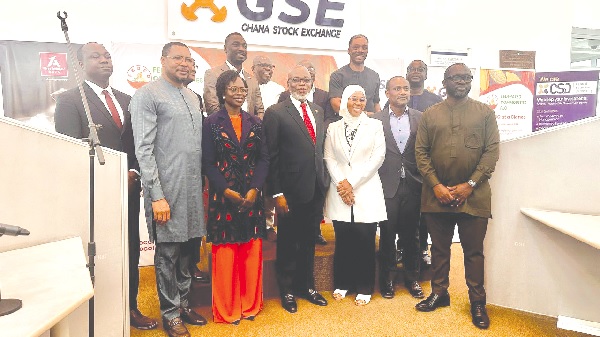THE journey of the Ghana Fixed Income Market (GFIM) has been distinguished by innovation, resilience and dynamic drive for progress.
GFIM has not only supported the government’s financing needs, but also laid the foundation for private sector access to both long-term and short-term capital.
This article maps GFIM’s footprint over the past decade — highlighting its milestones, achievements and the challenges that have shaped its journey.
It also reflects on the lessons learned and sets out the opportunities that lie ahead as the country continues to strengthen its position as one of Africa’s most transparent and dynamic bond markets.
Early beginnings
August 15, 2015, marked a turning point in Ghana’s capital market. Prior to its formation, trading in government and corporate securities was largely bilateral, limiting price discovery, efficiency, and investor participation.
The market was formed by key stakeholders in the financial market, led by the Bank of Ghana (BoG), the Ghana Stock Exchange (GSE), the Central Securities Depository Ghana Ltd (CSD), the Ghana Association of Bankers (GAB), the Ministry of Finance, the Financial Market Association (ACI Ghana) and the Licensed Dealing Members (LDMs) of the GSE.
This collective effort provided Ghana with a centralised, rules-based platform for the trading of fixed-income securities.
Building blocks of growth
The market’s evolution can be traced through several key milestones:
* Market infrastructure development – The deployment of electronic bond trading platforms that enhanced transparency, centralised price formation and improved efficiency in trade execution.
* Product diversification – While the government securities remain dominant, the market includes corporate bonds, commercial papers and green and sustainable bonds providing alternative financing channels.
* Regulatory enhancements – The introduction of clear GFIM rules, SEC’s Capital Market Master Plan, and a robust oversight framework have boosted investor confidence.
- Liquidity and secondary market growth – Turnover grew significantly, with Ghana’s bond market becoming one of the most liquid in Sub-Saharan Africa outside South Africa and Nigeria.
Performance trends
The GFIM volume performance has been phenomenal, growing from its humble beginnings in 2015, when trading volume stood at GH¢5.2 billion.
The market volumes enjoyed a positive growth trajectory from 2015 to 2022, peaking at GH¢230 billion in volume traded in 2022.
GFIM suffered its first dip after seven years of sterling performance in 2023, following the implementation of the Domestic Debt Exchange Programme (DDEP).
The DDEP hit the volume performance so hard due to losses that investors suffered and dropped the volume performance from GH¢230 billion to GH¢98 billion in 2023.
However, the market started a rebound last year after the DDEP turbulence and the recovery of the economy.
The market saw an impressive volume growth of 76 per cent from GH¢98 billion to GH¢174 billion between 2023 and 2024.
This growth trend is expected to continue as the volume traded as of September 2025 had reached GH¢185 billion.
Cumulative volume performance
As of September 2025, volume traded on the GFIM reached GH¢1.07 trillion from GH¢5.2 billion in 2015 in 10 years.
This is a remarkable feat and still leaves room for improvement.
The government bonds have dominated the GFIM space, with corporate bonds growing gradually to provide financing solutions for businesses to diversify their funding sources. Corporate bond issuances to date amount to GH¢24.32 billion.
Some achievements
* Market transparency – Market reports and yield curve publication improved price discovery and market discipline.
* Increased participation – Growth in the number of dealers, fund managers, pension funds and retail investors accessing the market.
* Regional recognition – Ghana’s bond market has been consistently highlighted in African bond market surveys as one of the most innovative and transparent.
* Global recognition – Under the GSE, we are part of the International Capital Market Association (ICMA) aligning Ghana’s fixed income market with global best practices and strengthening its visibility on the international stage.
* Contribution to capital formation – The market has supported the financing of critical infrastructure, government programs, and corporate expansion.
Despite the progress, the market has faced hurdles:
* Macroeconomic pressures – Exchange rate volatility, inflation and fiscal pressures have impacted investor confidence and pricing.
* Limited corporate issuance – Despite regulatory support, corporate bond issuance remains modest compared to government securities.
* Market concentration – Government debt instruments dominate trading activity, limiting diversification.
* Settlement and operational risks – The need for continuous upgrades to market systems and alignment with global best practices remains.
Lessons learned
* Collaboration is key – The combined efforts of regulators, the GSE, market participants, and investors have driven progress.
* Infrastructure matters – Strong trading, settlement and reporting systems are essential for efficiency and trust.
* Importance of market education – Building a culture of fixed income investing requires continuous awareness and capacity-building.
* Resilience in adversity – Market reforms must be designed to withstand economic shocks.
Road ahead
The next decade of Ghana’s fixed income market will likely be shaped by:
* Deeper corporate market development – encouraging more private sector issuances.
* Sustainable finance instruments – Expanding green, social, and sustainability bonds.
* Regional integration – Positioning Ghana as a hub within the African Continental Free Trade Area (AfCFTA) financial markets framework.
* Technology and innovation – Leveraging fintech, blockchain and data analytics to further deepen the market.
Conclusion
GFIM’s 10-year journey reflects the story of transformation, resilience, and opportunity. From its modest beginnings to becoming a benchmark for transparency in Africa, GFIM has laid a solid foundation for the future.
The next chapter promises to build on this legacy — driving inclusive growth, sustainable financing and regional leadership.
